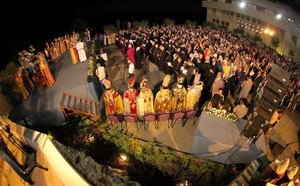In a recent ceremony in Bikfaya, Lebanon, the Armenian Church of the Holy Muron was blessed – symbolically anointing the 1.5 million martyrs of the Armenian Genocide. The World Council of Churches (WCC) general secretary the Rev. Dr Olav Fykse Tveit gave an address at the event.
The oil of anointing in the Armenian Church is called the Holy Muron. Believers hold a special reverence for the tradition lying behind the use of this consecrated oil.
The ceremony at the Armenian Church of the Holy Muron was hosted by the Armenian Apostolic Church (Holy See of Cilicia) and was held at St. Mary’s Monastery on 18 July. It is one in a series of events world-wide marking the one hundredth anniversary of the 1915-1923 genocide.
The ceremony was led by Catholicos Aram I of the Holy See of Cilicia, along with other church leaders.
In his address at the ceremony Tveit said that “the memory of the victims moves us to take pro-active measures to stop all attacks against humanity.”
“Together we must use the opportunities and instruments of international law and cooperation we have for learning, knowing and naming the truth, for reconciliation, for justice and for peace,” Tveit added.
“The blessing of the Holy Muron today acquires a greater level of sanctity. It symbolizes the perfection of virtues that we receive through the Holy Spirit. It also symbolizes the resurrection and the spiritual renewal of the people of faith. Today as we celebrate the life of our churches, we also remember and honour the martyrs of the Armenian genocide as human beings,” said the WCC general secretary.
Speaking of his participation in anniversary events commemorating the Armenian Genocide, Tveit said that he had the “opportunity to witness the living hope and faith of the Armenian people”.
“The presence of the church and the people of Armenia today is a sign of the power of the triune God, the creator, the resurrected and the giver of life, as we see not only survival, but a determination to claim the fullness of life that God desires for each human being.”
Tveit went on to say that the Middle East is suffering from “systems of injustice”. He said the recent agreement on nuclear power with the Iranian government offers some hope of diplomatic efforts towards peace for the peoples of Syria and Iraq. “We pray that this fragile hope may be strengthened, that this agreement may be a beginning of new dynamics in the region,” Tveit added.
The WCC general secretary especially commended the role of the churches in Lebanon.
“We are gathered in a country that hosted thousands of survivors of the Armenian genocide, a country that hosted the orphans, the women, the elderly: the Church. A country that witnessed wars, conflicts but also peace and reconciliation. Today, 100 years afterward, Lebanon continues hosting hundreds of thousands of the survivors of the wars in Syria and in Iraq,” Tveit said.
Speaking of the WCC’s vision of a “pilgrimage of justice and peace”, Tveit said, “This is a pilgrimage of faithful conviction, defined by the unity to which God calls the Church, humanity and all of creation. You are all invited to join this pilgrimage. Let us together explore and celebrate the deep meaning and richness of peace. Let us commit ourselves to promote life and the dignity of all.”
-----
Read the full text of WCC general secretary’s speech at Holy Muron ceremony
WCC Executive Committee releases statement on Armenian genocide(WCC news release of 11 June 2015)

